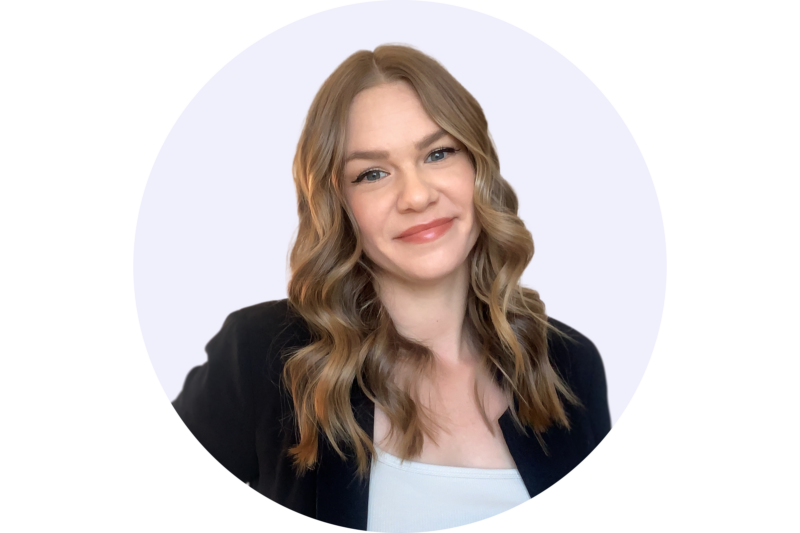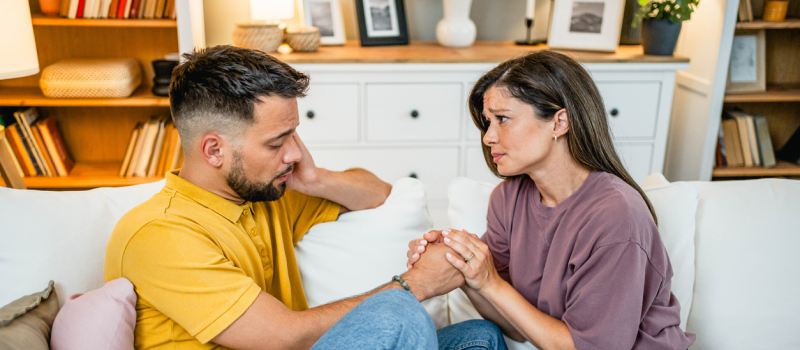
Table of Contents
Here’s What Relationship OCD Looks Like (and How to Heal)

Written By: Sarah Fielding

Clinically Reviewed By: Sarah Lyter
September 24, 2024
5 min.
Everything you need to know about relationship OCD and coping with it, according to experts.
Learn more about our Clinical Review Process
Table of Contents
Mental health conditions can cause difficulties and uncertainty even in a very healthy relationship. For people who struggle with relationship OCD, this can look like repetitive behaviors (compulsions) and intrusive thoughts (obsessions) about their relationship.
“Obsessive-compulsive disorder manifests in many different ways and can sometimes be focused on one central theme,” says Charlie Health Senior Primary Therapist Sarah Lyter, LCPC, MA.
In the case of relationship OCD, common obsessions center on doubts about the relationship, concerns over a partner’s feelings or attraction, fears of making the wrong choice of a partner, and more. Read on to learn how to recognize the signs, communicate effectively with your partner, and develop coping strategies to manage the symptoms of relationship OCD.

We can help you or your partner cope with OCD
Virtual intensive therapy for OCD and other mental health conditions.
Signs of relationship OCD
OCD typically presents in childhood or adolescence and by a person’s early twenties, the International OCD Foundation reports. About one in 40 adults and about one in 100 children experience OCD. As mentioned, people with relationship OCD can experience persistent doubts about their relationship or their partner and engage in related compulsive behaviors. Here are some common obsessions and compulsive behaviors connected to relationship OCD:
Relationship OCD obsessions
- Doubts
- Overanalyzing
- Perfectionism
- Comparison
- Concern about making a mistake
- Fear of not being loved or of not loving enough
Relationship OCD compulsions
Lyter says that compulsive behaviors can look like seeking reassurance, mental review, avoidance, and testing feelings. Charlie Health Group Facilitator Clary Figueroa, MSW seconds this, explaining that individuals living with relationship OCD might “seek reassurance that their relationship or partner is right for them, may compare their relationship to others or their partner to other people, may avoid situations or activities that trigger their unwanted thoughts and doubts, and may experience significant distress after negative events in their relationships.”
Can you be genetically predisposed to OCD?
Mental health disorders can occur seemingly randomly, but individuals often have some predispositions that lend themselves to developing them. These could be anything from another condition to a traumatic event. According to Lyter and Figueroa, some of the factors that can make someone more likely to experience relationship OCD include living with the following:
- General OCD
- General anxiety disorder
- Social anxiety disorder
- Depression
- Childhood or past relationship trauma
- Family history of OCD
- Insecure attachment style
- Fear of intimacy or rejection
- Perfectionistic tendencies
- Low self-esteem
- Extreme stress
- Current life transitions
People with a history of OCD in their family are more likely to experience it, emphasizes Figueroa. However, researchers are still conducting studies to determine the exact reason behind this, the National Institute of Mental Health (NIMH) reports.
How to speak to your partner about relationship OCD
Relationship OCD can feel overwhelming and frustrating when trying to enjoy a healthy relationship. There are a range of coping mechanisms that can improve relationship OCD symptoms. One of the most important aspects can involve talking to the other person. Relationship OCD can apply to dynamics that aren’t romantic, such as friendships. While we use the wording of a romantic relationship, these tips for talking to the other person can also apply in platonic relationships.
If you’re experiencing relationship OCD, then the first step — before diving into any sort of conversation — is to reflect on your emotions and work on distinguishing the difference between rational thoughts and those fueled by relationship OCD, advises Lyter. Then openness is vital when it comes time to speak with your partner. “I think being open about their symptoms can help. They will need to work with their partner about their triggers and ways their partner can support them,” says Figueroa. Take the time to explain what relationship OCD looks like for you and how it feels within your relationship.”
However, you want to be careful not to spend the entire conversation seeking their response that everything is alright. “Break the reassurance cycle,” says Lyter. “Avoid seeking reassurance, and focusing on sharing rather than gathering feedback, comfort, or assurance.” She also recommends using “I” statements to take ownership of how you feel and your experience in the partnership. This framing further contributes to creating boundaries with your partner and giving them time to process this information. As Lyter says, “Have patience and understanding for your partner and how this may be difficult for them.” Figueroa and Lyter both add that it can be beneficial to work with a couples therapist specializing in relationship OCD.

How to cope with relationship OCD
Relationship OCD doesn’t have to feel like it’s controlling your mindset and can be managed with the right care. Part of that might involve seeking a relationship therapist experienced in OCD treatment for yourself, apart from whether you and your partner visit one. “Exposure-response therapy can be very beneficial as well as cognitive behavioral therapy (CBT) to challenge OCD brain,” says Figueroa. “Another big thing is learning to be okay with uncertainty and feeling uncomfortable and a therapist can really help with guiding someone and helping them with exposures.”
On your own or with the support of a therapist, you can explore additional coping techniques. According to Lyter, it can help you to:
- Educate yourself on relationship OCD to gain a better understanding of it and to fully acknowledge your valid experience
- Practice mindfulness and radical acceptance
- Challenge cognitive distortions and reframe negative thoughts with CBT
- Break the reassurance cycle and learn to sit with your discomfort, and limit comparisons and “checking in” with your partner to quell obsessions
- Practice self-compassion and be patient with yourself
- Use coping skills such as healthy distractions and enjoyable activities

How Charlie Health can help
If you or a loved one are struggling with OCD symptoms or relationship anxiety, Charlie Health is here to help. Charlie Health’s virtual Intensive Outpatient Program (IOP) provides mental health treatment for people dealing with serious mental health conditions, including relationship OCD that’s affecting well-being. Our expert clinicians incorporate evidence-based therapies into individual counseling, family therapy, and group sessions. With this kind of holistic online therapy, managing your mental health is possible. Fill out the form below or give us a call to start healing today.




